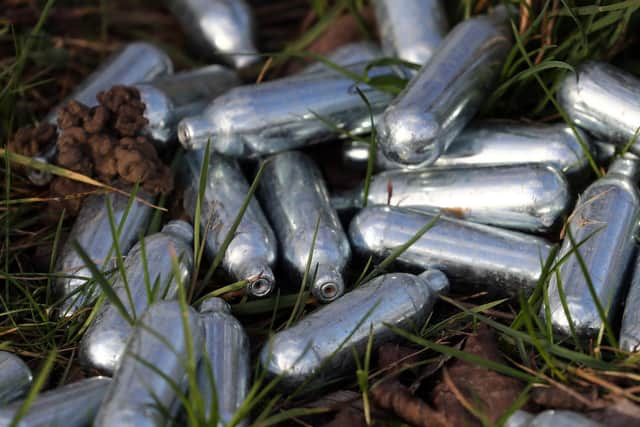Nitrous oxide: experts warn laughing gas possession should not be criminalised
and live on Freeview channel 276
Health experts have warned the ban of nitrous oxide could stop users seeking medical help.
In a letter to the government, seen by BBC Newsnight, 15 neurologists and related health experts say possession of the drug should not be criminalised.
Advertisement
Hide AdAdvertisement
Hide AdThey say the ban could worsen the stigma around users, but the government has said it plans to go ahead with the ban.
Nitrous oxide, also known as laughing gas, is a colourless gas sold in metal canisters and is one of the most commonly used drugs by 16 to 24-year-olds.


Possession of the drug is not banned, but supply for recreational use is. However, the government has proposed an amendment meaning it would become illegal to possess the drug.
Under the proposals, anyone found in possession of the drug could face up to two years in prison, an unlimited fine, or both. The government has launched consultations of the plan, both with experts and the public.
Advertisement
Hide AdAdvertisement
Hide AdHeavy use can lead to nerve-related symptoms - being unable to walk, falling over, or experiencing tingling or loss of sensation in the feet and hands. Some users have nerve-related bladder or bowel problems, erectile dysfunction or incontinence.
Chris Philp wrote to the minister for policing saying the 15 medical professionals say making possession of the drug illegal was "unlikely to translate to health benefits in our patients".
That is despite leading medics telling Newsnight they have seen an increase of nitrous oxide patients.
The author of the letter, Dr Alastair Noyce, Professor of neurology and neuroepidemiology, said the ban risked creating "fear of a criminal record" among young users.
Advertisement
Hide AdAdvertisement
Hide Ad"People may delay coming to hospital at a time when their symptoms are treatable," he said. "The net effect of that may be that they develop long-term harm damages."
He said there was "very little evidence that the criminalisation will lead to reductions in neurological harm and will impact people's opportunities who are not in education and employment".
The letter suggested the government to fund a national education campaign in schools and through the media "to ensure the public understand the risks posed by nitrous oxide misuse".
The Drug Science scientific charity said a blanket ban was "completely disproportionate" and "would likely deliver more harm than good".
Comment Guidelines
National World encourages reader discussion on our stories. User feedback, insights and back-and-forth exchanges add a rich layer of context to reporting. Please review our Community Guidelines before commenting.
